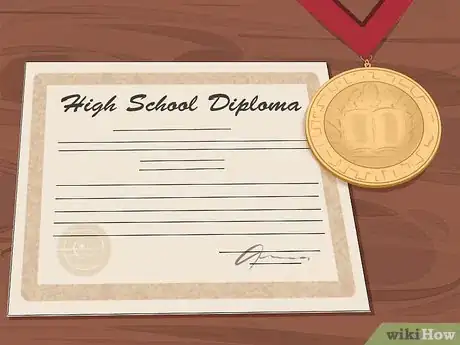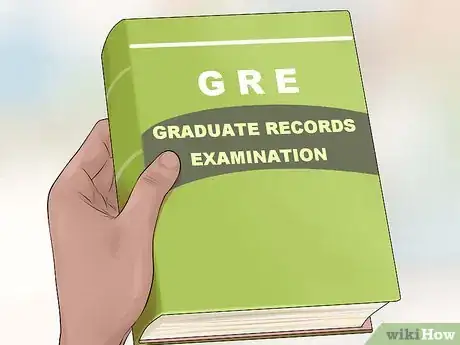This article was co-authored by Felipe Corredor. Felipe is a Senior College Admissions Consultant at American College Counselors with over seven years of experience. He specializes in helping clients from all around the world gain admission into America's top universities through private, one-on-one consulting. He helps guide clients through the entire college admissions process and perfect every aspect of their college applications. Felipe earned a Bachelor's Degree from the University of Chicago and recently received his MBA.
There are 38 references cited in this article, which can be found at the bottom of the page.
wikiHow marks an article as reader-approved once it receives enough positive feedback. In this case, several readers have written to tell us that this article was helpful to them, earning it our reader-approved status.
This article has been viewed 1,027,468 times.
Teaching at a university is a rewarding career, but with a declining number of available positions, becoming a college professor isn't easy. More than 70 percent of all college faculty currently teach off the tenure track, meaning their future at the university is not stable. For many adjunct professors, getting an advanced degree is a path into poverty; more than 33,000 Ph.D. holders are currently on public assistance.[1] Think very carefully before embarking on a path to become a professor.
Steps
Completing Your Undergraduate Degree
-
1Succeed in high school. If you know in high school that you would like to become a college professor, then get the highest grades possible so you can gain admission into an excellent undergraduate institution. Reputable graduate programs often accept applicants from similarly reputable colleges and universities.[2]
- Set a clear study schedule for yourself and plan out your assignments weeks in advance. If you plan ahead now, you will establish the necessary time management skills you will need in college.
- Divide your time into manageable chunks. Don't plan for large chunks of time (like 4 or 5 hours) because it might be harder to maintain that level of attention and commitment. Instead, create manageable 1-2 hours blocks of time to study and complete projects.
- Study for your standardized tests. Your SAT and ACT scores are a key part of your application package. You can find study tips and practice tests at the College Board's web site. You should study for a few months before the test -- don't cram for it the night before.
- You can also check out test prep books at you local library, take prep courses offered by companies like Pearson and Kaplan or look into studying with a private tutor.[3]
-
2Research undergraduate programs with successful graduates. Many college departments will list how many students gain acceptance to graduate school on their web site. You can also ask an admissions officer how many students go onto Ph.D. programs from their university's department.
- Consider the size and scope of your university. Small liberal arts colleges are great for getting a personalized attention, but they tend not to have the resources for archival research provided by larger universities.[4]
- Similarly, with a larger university, you will need to work extra hard to become known to your professors since many of them will teach very large survey courses or they will only teach upper level courses and graduate courses. Attend department events and stop by your professor's office hours to express your interest in the material and discuss specific projects. This will help your professors get to know you when they have hundreds of other students.
- When you invest plenty of time researching a university you're interested in, you'll be able to impress the admission officers and faculty with how knowledgeable are about the college and what its mission is.
- If you are planning to attend a large university, you should also look into joining an honors college within the university as this will give you a smaller cohort and more individual attention.[5]
Advertisement -
3Perform well in college. Your performance in your undergraduate program will be the major factor that your graduate committee will consider when they admit you. Make sure you manage your course load so you can balance your responsibilities. Anything more than four reading intensive courses each semester will be difficult to manage. [6]
- Don't overload courses. You will need to strengthen your reading skills in college as most graduate programs require you to analyze an intensive amount of reading material. But don't feel pressure to cram extra courses into each semester. Talk to your advisor about the recommended amount of courses to take for your graduate school aspirations.
- Maintain a high GPA. You should have a generally high GPA, but in the courses of your major, most graduate programs will expect you to earn grades of an A+, A or A-. If you have consistently earned C's, Ds or failed courses in your major, then graduate school might not be for you.[7] .
- Work or volunteer as a tutor. This could be in a position in your school's writing center or you could tutor students at a local high school. In most graduate programs, you will be expected to do some form of teaching and tutoring while you are an undergrad will indicate your interest in this role.[8]
- Work or volunteer in a professor's laboratory. Many professors need and welcome undergraduates into their labs to do some of the basic tasks of research. The professor will likely write you a letter of recommendation and give you valuable advice for applying to graduate schools.
-
4Take an internship. An internship will give you valuable professional experience and will allow you to learn outside the space of a classroom. It will also help you to build a professional network outside of academia.
- Talk to your university's career center for tips on finding a rewarding internship.[9]
-
5Build up other skills. While being a strong reader and writer are essential skills for most graduate programs, you should consider developing other skills that can translate inside and outside of academia.[10]
- Consider taking a web development class and an introductory data analysis or statistics course. These courses will give you vital technological and quantitative skills that will translate into a variety of professions, not just graduate school.
-
6Take a graduate level course. In your senior year, consider enrolling in a graduate level course if your school offers a Master's or Ph.D. program. This will give you a sense of the level of work required by a more advanced degree.[11]
- If your advisor is offering a graduate level course, ask them if you think you should enroll in it. This will let them know that you are interested in graduate study.
-
7Think about why you want to go to graduate school. In order to become a college professor, most departments require you to have a Ph.D. Before you begin the application process (which is very time consuming), you should think deeply about why you want to attend, especially when the promise of job security after you graduate with a Ph.D. is very unlikely.[12]
- Are you afraid to go on the job market after graduating with your B.A.? Do you not know of anything else to do? These are not good reasons to go to graduate school.
- Even if you have a genuine passion for your discipline and want to study if further, consider if you would be willing to do this after ten years of very hard work with little pay and no job security.[13]
Applying to Graduate School
-
1Research different programs. Particularly, research how many of their graduates have been placed in tenure-track jobs in the past ten years. If the department doesn't supply this information on their web site, this is a red flag.[14]
- You should aim to apply for 10-15 programs. Aim high when you apply; only 50% of all Ivy League Ph.Ds go on to earn tenure-track jobs and the percentage decreases at lower tier programs. Going to a very prestigious school will help your chances of getting a tenure-track job.[15]
-
2Find potential advisors. In graduate school, you will work much more closely with your advisor than in undergrad. You should look for faculty members who have the title of Associate Professor or just Professor. This means they have tenure and they have a stable future at the university.
- If a faculty member has a title of Assistant Professor or Visiting Assistant Professor, then this means they are only tenure-track or on a limited term appointment. Do not pick them as an advisor as their future at the university is uncertain.
- As most Ph.D. programs last between 5-7 years, you will need someone who will be at the university for a long time to support you and approve your dissertation.[16]
- Take the time to read that professor's research. Don't just peruse their interests as they are listed on the faculty web site -- read articles and books by them to see what kinds of contributions they have made to their field.
-
3Consider the funding options. Don't go into significant debt for a Ph.D. Unlike a J.D. or an M.D. degree, the Ph.D. generally does not offer very lucrative careers that can pay down large amounts of debt (the average salary of a tenure-track Assistant Professor is $53,000; the average salary of adjunct professors is $25,000-$27,000, although it can be much lower). Your Ph.D. program should at least cover tuition and should also provide some sort of living stipend.[17] ,
- If you already have significant debt from your undergraduate degree, you should consider if it is worth it to take on additional debt for another degree or if it might be worth to spend a few years paying down your debt.[18]
- Many programs offer funding through Teaching Assistantships or Instructor positions. Beware of programs that want you to begin teaching in your first year of coursework or programs that want you to teach more than one course a semester. A heavy teaching load will make it difficult for you to finish your research.
- Look for grants on the U.S. Department of Education's web site or for grants offered for graduate students by your professional organization (such as American Psychological Association).[19]
-
4Make an application timeline. After you have decided which 10-15 programs you want to apply to, make a timeline including all the relevant information for each application. When is the due date for each application? Do they all require the same materials or do some require different components (such as a portfolio)?
- You should start the application process a few months before each due date. Talk to your advisors and let them know you are thinking of applying to graduate school. Ask them if they will be able to write letters of recommendation for you. You should make a formal request for a letter of recommendation at least a month before the application is due.
- At the beginning of the fall semester of your senior year (or in August if you have graduated), contact your university's career for any guidance on applying to graduate school. They will have lots of guidance and can help you network with alumnae who have gone on to graduate school.
-
5Study for the GRE (or Graduate Records Examination). Most Ph.D. programs require the GRE; they often also require a GRE subject test in your area. As with the SAT, you should give yourself time to study and practice taking this test. Do not cram in the night or week before the test.
- Look for prep test courses and study guides offered by your university's career center. You can also study with guide books, takes practice tests offered through Educational Testing Service, or look into using a tutor to help you prepare.[20]
- In most major cities, the GRE is offered year round when taken on the computer. The fee for taking the test is $195 and can be paid on-line with most major credit or debit cards at Educational Testing Service's web site.
-
6Prepare your personal statement. Your cover letter should clearly state your professional interests in the program and which field of study you would like to pursue. Most graduate programs require some form of specialization (i.e. if you study history, you will have to choose a geographical and historical specialization, like early American history before the Civil War).
- Clearly state which faculty members you want to work with in your cover letter. Explain how their research interests align with yours. Discuss which experiences in your background make you prepared to study this field.
- Avoid making any cliche statements, such as sentences that start with the phrase "I always knew I wanted to teach this subject" or "Ever since I was a child, I loved reading." Instead, focus on what research questions you are interested in exploring in the program.
- Obsessively proofread your cover letter. If you include any typos or grammatical errors, this will indicate to the committee that you are either a weak writer or a lazy one. Don't let you entire application be thrown out over something that is easily fixable.[21]
- Learn more at our Guide to Writing a Personal Statement for Grad School
-
7Submit a stellar writing sample. Your writing sample should be flawless and meet the page requirements as stipulated in the application. Do not include a shorter or longer sample; this is a quick way to get your application dismissed.[22]
- Make sure the writing sample is a reflection of your research interests. If you want to study ancient Egyptian art but your writing sample is on the Impressionist movement in the late 19th century, then this will not give the committee a clear idea of your research strengths.
- Work with your college's writing center to get feedback on your writing sample. Does it make sense to someone who doesn't know very much about the subject of your research? Is it clearly written?[23]
- As with your personal statement, make sure your writing sample is grammatically pristine and contains no typos.
-
8Be patient. After you have submitted your application, be patient when waiting to hear back. Most graduate school applications are due in late fall/early winter but you may not hear back until the middle of the spring semester.
- Do not keep bombarding the department administrative assistant for updates on the status of your application. This is a quick way to get rejected. The school will let you know if your application has been accepted or rejected.
-
9Visit the campus. Some programs require their applicants to interview before they admit them. You should participate in this interview if only to get a more in-depth sense of the program and how it supports its graduate students.[24]
- Many other programs will offer visiting weekends for students who have been accepted. Once you have narrowed your choices down to 3-4 options, try to visit at the schools you are most interested in.
- Meet with the faculty members you want to study with on your visit. Are they interested in working with you? Do they have no clue who you are? Do they seem to be the most popular advisor in the department, perhaps working with too many graduate students? If you answer yes to the latter two questions, that might be a sign this department wouldn't be the best fit for you.
- Ask questions from current students in your program who work with the faculty members you want to work with. Does the faculty member support his or her advisees? Will she provide feedback on your research in a timely manner? Does she encourage students to attend conferences or meet colleagues she knows at other institutions? Does she help students to get published in reputable journals?
- Consider other factors about the institution. Is the university in a very small college town or is it in a bustling, expensive city? Is this a place that you would be happy to live in for 5-7 years? How will you be able to afford to live in this place on a graduate student stipend?
- If you can, try to stay with a current graduate student when you visit. That way, you will get a sense of what kind of housing grad students can afford. Can they live on their own in a nice neighborhood or do they have to have multiple roommates? Is it easy to find an apartment in the city or is the rental market really competitive?
Succeeding in Graduate School
-
1Ace your coursework. For the first couple years in your program, you will likely be required to take a range of courses. Try to focus on taking classes with the faculty members you want to advise your dissertation. Taking a class with a faculty member will give them a sense of your strengths and interests.
- Read strategically. You will have an overwhelming amount of reading to complete in graduate school -- perhaps multiple books each week. As you read, take in-depth notes and highlight the most important sections or moments from each text.[25]
- You can also generally get a reading list from your professor or find the book list on the course schedule in the summer or winter break before the class starts. Completing some of this reading ahead of time will give you a lighter load for when you are mired in work during the semester.
- In your first and second years, you should attend as many department events as you can -- talks from current faculty and visiting scholars, graduate student presentations, department parties, etc. This will show your investment in your professional setting.
-
2Join the academic conversation. In your first and second years, you should spend time familiarizing yourself with your academic field. Spend a couple hours each week reading the major academic journals in your field (if you don't know what these are, ask your advisor or a faculty member in that field). This will give you a sense of the broader conversations happening in your discipline.
- Join your professional organization. You should join early in your career in graduate school and maintain your membership. Most organizations offer reduced membership fees for graduate students.
- If you are studying English or a romance language, this will be the MLA (Modern Language Association), or the American Psychological Association if you are in a psychology department. In your third or fourth years of the program, you should plan to attend the major conference hosted by this institution.
-
3Make publishing a priority. Most tenure-track jobs (even at less research focused institutions) now require applicants to have published at least one article. Scientific disciplines often expect an even more extensive publication record since most papers contain multiple authors.
- Join a writing group in your department (or start one if it does not already exist) that will give you deadlines for turning a paper you wrote for your course work or qualifying exams into a piece of criticism.[26]
- Remember that the process for publishing can take a long time. Some journals might take months before they let you know if they have accepted, rejected or requested that you revise and resubmit your article. After that, it could take even longer before it appears in print. If you want to have a publication by the fourth year in your program, then start to prepare it in your second year.[27]
- Ask your advisor for guidance on which journal you should send your article to. Some journals do not publish graduate students as a rule whereas others are more welcoming toward junior scholarship.
-
4Gain teaching experience. Teaching experience will prepare you for the daily responsibilities of a college professor. Many Ph.D. programs have teaching opportunities built into their programs, where you will often teach freshmen or sophomore level courses or leading a lab for a large section of an introductory course.[28]
- If these opportunities are not built into your program, then you may need to apply for teaching opportunities. Talk to your advisor about the best way to secure a teaching appointment.
- Look into taking a Teaching Assistant position. In these positions, you generally assist a professor with things like grading, taking attendance, and helping students during group work in class. But make sure that you have the opportunity to contribute some of your knowledge to the course; just working as a grader might not give you enough professional experience to be a teacher.[29]
- Save lesson plans, syllabi, student evaluations and lecture notes for your teaching portfolio. These will be necessary documents for when you apply for a tenure track job.
-
5Consider interdisciplinary certificate programs. Many graduate schools will offer certificate programs for graduate students in other departments that supplement your core interests as a scholar. Popular options often include programs in Women and Gender Studies, American Studies, Writing and Rhetoric, Non-Profit Management, Digital Humanities, On-line Teaching and Learning, Instructional Design, etc.
- Completing a certificate in one of these programs could make you a more competitive candidate for jobs inside and outside academia than applicants who just have a degree in one field.
-
6Design a compelling dissertation. The most complicated component of the Ph.D. program is writing and defending a dissertation, which is a book-length research project. Most departments will require that you submit a proposal at the beginning of the writing process for your topic. When you finish writing it, you will have to defend your work in front of a committee of faculty members who have read it.[30]
- Set up a clear, easy-to-follow writing schedule with frequent deadlines. Some programs will give you a year of funding to write you dissertation; you should have at least a couple chapters completed before you embark on this.
- Break down your time into manageable chunks. Give yourself one or two hour blocks of time with achievable goals, like adding an extra three pages to your introduction or analyzing in an extra scholarly source.[31]
- Maintain clear communication with your advisor. As you are writing, don't fall off of your advisor's radar. They should approve each chapter as you go. Plan to check in with them every 2-3 weeks during the writing process so they get a sense of your progress.
-
7Schedule your defense far in advance. Once you have completed your dissertation, Most Ph.D. programs require you have somewhere between 4-6 faculty members to conduct a defense of your work. They will ask you critical questions about the strength of your arguments and also offer other perspectives on your work.
- Coordinating the schedules of multiple academics can be tricky. In many departments, the administrative assistant will coordinate the schedules of your readers, establish a date and time, and book a room for you, but you should contact him early in the semester you plan to defend to do this.[32]
- To prepare for your defense, re-read important moments in your dissertation (introduction, conclusion and the thesis statements of each chapter) so you can quickly and eloquently respond with the key points of your argument.
- Take a deep breath and remember that no one knows your work better than you. You have spent years with this material and you have every ability to defend it successfully.[33]
Taking a Tenure Track Job
-
1Go on the job market. Most tenure track jobs are posted in the fall semester of the academic year before they are meant to begin. They will generally have the title of Assistant Professor.[34]
- Job postings for tenure track jobs are often listed on the web site of your major professional organization (like the Modern Language Association or Computer Research Association) or other places like HigherEdJobs, the Chronicle of Higher Education, and H-Net.
- Most academic candidates go on the market in the last year of their program when they are still ABD (all but dissertation). You should plan to have defended your dissertation and earned your degree by the time the tenure track job begins in the fall of the next academic year.
- You will generally need many of the same documents that you used to get into graduate school: a cover letter (personal statement), a C.V. listing your academic accomplishments such as publications or teaching awards, a writing sample, letters of recommendation from your advisors, etc. You also will be frequently required to present a teaching portfolio consisting of things like student evaluations, lesson plans, a statement of your teaching philosophy, etc.
-
2Survive the job interview. Interviews for tenure track jobs are notoriously rigorous. First, you may have to pass preliminary interviews conducted at the conference hosted by your major professional organization. You may also have a phone or Skype interview, which will be less expensive to attend than traveling to the professional conference.[35]
- You will generally be asked questions about your research, what contributions do you make to the field, how did you become interested in your topic, etc. You will also be asked questions about teaching -- such as how you structure a lesson plan or how you manage a large survey class. You should have tangible examples to provide when you get these questions.[36]
- After you pass the preliminary round of interviews, you will be asked to come on a campus interview. The campus interview generally lasts 2-3 days. You will travel to campus and may be required to do some of the following things: give an extended talk (25-50 minutes) on your research interests, lead a class to demonstrate your teaching interests, and conduct multiple smaller interviews with members of the job search committee or other faculty members.[37]
- Always express interest in the research of other faculty members while you are on your visit. You want to make it clear that you are a helpful, congenial potential colleague.[38]
- You also will be required to meet with the Chair of your department, the Dean of your college and possibly other administrative figures. These interviews generally take place in the spring semester before the fall semester when they plan to hire you.
-
3Prepare for tenure review. Once you have been hired, most institutions expect to assess faculty members for tenure within seven years of starting as an Assistant Professor. However, they will often require pre-tenure review within the first two years of appointment and then again in the fourth of fifth years.
- Departments have different requirements for tenure review. Once tenure is awarded, the professor has a secure future at the university (barring any major financial crisis) and the professor can enjoy a lifelong career teaching students in the subject of their expertise.
- For the humanities, you often have to publish at least one book with a reputable academic press and/or multiple articles in well-respected journals.
- For the sciences, you have to receive funding from an institution like the National Institutes of Health or the National Science Foundation to start a lab and procure the equipment need to conduct your experiments. Writing and winning grants for this has become increasingly difficult, especially with major financial cuts to these institutions.[39]
-
4Learn the culture of your department. As you are preparing to apply for tenure, consider where you should focus your energies. Does the department value research or teaching more? If it values research, resist the urge to spend extra time mentoring students or planning events for students in the department. Put that time into conducting research.[40]
- Similarly, if the department mostly values commitment to students (as frequently is the case as liberal arts colleges and community colleges), then put more of your focus on advising and supporting students. Consider serving as the advisor to a student group in your department.
- Always talk to your chair or dean about the expectations for tenure at your university. Most schools want to improve their national profile, which means that the will value research. From your first year forward, work as hard as you can to meet those expectations.
-
5Maintain the appropriate records. For your tenure review, you will often be required to produce an extensive file of documents cataloguing your successes in the department. These often include:[41]
- Student evaluations and evidence of your teaching record (lesson plans, syllabi, etc.)
- Copies of all of your publications or any technical documents/creative projects
- Letters from scholars at other institutions which assess the value of your research
- A log of your service to your institution, any additional certifications you have earned
- After you have compiled your dossier, the tenured members of your department will vote on whether or not to recommend you for tenure, Your file will also be sent out to other faculty members from other departments for review. The final decision will be made by the President, Provost or Chancellor at your university.[42]
Taking a Non Tenure Track Job
-
1Go on the job market. With the increasing scarcity of tenure-track jobs, more Ph.D. holders are taking limited term or contingent faculty positions. Non-tenure track professors currently make up more than 70% of all teaching positions in the American university. Some of these titles include:
- Post-doctoral research fellow
- Visiting Assistant Professor
- Lecturer (often with different levels such as Lecturer I or II or Senior Lecturer)
- Adjunct
- The first two categories of jobs can sometimes be found posted during the fall alongside tenure track jobs, but they are also regularly posted during the spring and throughout the academic year. Lecturer and Adjunct positions are often interviewed closer to the start of the upcoming school year in which they are needed.
-
2Interview for a NTT job. The interview process for these jobs can be very similar to a tenure track job; you may have to go on a campus visit and give a presentation, but the focus will probably be more on your teaching abilities than your research.
- Beware of post-doc positions that have heavy teaching loads (such as a 4-4). A post-doc is meant to help you turn your dissertation into a book manuscript to publish. If the position requires you to have a heavy teaching load, you might not be able to accomplish this.[43]
-
3Understand the perils of adjuncting. With the rising costs of tuition and the growth of administrative salaries, many schools have turned to adjuncting to cover the bulk of their teaching needs.[44]
- Adjuncts are Ph.D. holders who are often kept on a part-time basis so they do not receive benefits or health insurance from the university. They are not paid a salary but rather, on a per-course fee which averages $2700.00. Currently, adjuncts make up more than 50% of the current college faculty workforce and they earn on average $25,000-$27,000 a year.[45]
- Because institutions are hesitant to grant adjuncts course loads that would make them full-time employees, many adjuncts are forced to teach at multiple schools in any given semester. They might have long commutes to get to many different campuses.
- Departments are also likely to cut courses at the last minute, leaving adjuncts to scramble to find other ways to supplement a meager salary. Working as an adjunct provides very little job security.
-
4Consider other career options. You might decide that working long hours for little pay, no health insurance, and no stability is not for you. In this case, you should spend part of your graduate career preparing for a life off the tenure track or even out of academia altogether.[46]
- Build up a portfolio of non-academic writing. You can volunteer to edit medical or technical documents, write grants for a non-profit in your area, or freelance for a local magazine or newspaper. But you should have a body of writing that translates outside of academia.
- Prepare to revise your job search materials. While a C.V. is supposed to be multiple pages in length, a resume should be no longer than one. A cover letter should be just one page also.[47]
- You must learn how to communicate your transferrable skills. If you lead a lab, you have project management skills. If you wrote and structured your dissertation, then you have excellent organizational prowess.[48]
- Think of alternative career paths. Many Ph.D.s go on to have successful careers in industry, non-profits, teaching at private high schools, researching in governmental jobs, or by starting their own businesses. Talk to the Career Center at your graduate institution about finding ways of transitioning out of academia.
- The web site VersatilePhD also provides tips from Ph.D.s who have found career paths beyond the tenure track.
Expert Q&A
-
QuestionWill it compromise my chances of becoming a college professor if I take a gap year?
 Felipe CorredorFelipe is a Senior College Admissions Consultant at American College Counselors with over seven years of experience. He specializes in helping clients from all around the world gain admission into America's top universities through private, one-on-one consulting. He helps guide clients through the entire college admissions process and perfect every aspect of their college applications. Felipe earned a Bachelor's Degree from the University of Chicago and recently received his MBA.
Felipe CorredorFelipe is a Senior College Admissions Consultant at American College Counselors with over seven years of experience. He specializes in helping clients from all around the world gain admission into America's top universities through private, one-on-one consulting. He helps guide clients through the entire college admissions process and perfect every aspect of their college applications. Felipe earned a Bachelor's Degree from the University of Chicago and recently received his MBA.
College Admissions Consultant Not necessarily. In fact, a gap year can be very efficient if you are resourceful about how you spend your time. While you take time off before entering another program, make sure to focus on enriching activities and experiences that will stand out on your CV. For example, you can travel and learn about the inspiration behind world literature.
Not necessarily. In fact, a gap year can be very efficient if you are resourceful about how you spend your time. While you take time off before entering another program, make sure to focus on enriching activities and experiences that will stand out on your CV. For example, you can travel and learn about the inspiration behind world literature. -
QuestionShould I also take part in extracurriculars while I'm on a path of becoming a professor?
 Felipe CorredorFelipe is a Senior College Admissions Consultant at American College Counselors with over seven years of experience. He specializes in helping clients from all around the world gain admission into America's top universities through private, one-on-one consulting. He helps guide clients through the entire college admissions process and perfect every aspect of their college applications. Felipe earned a Bachelor's Degree from the University of Chicago and recently received his MBA.
Felipe CorredorFelipe is a Senior College Admissions Consultant at American College Counselors with over seven years of experience. He specializes in helping clients from all around the world gain admission into America's top universities through private, one-on-one consulting. He helps guide clients through the entire college admissions process and perfect every aspect of their college applications. Felipe earned a Bachelor's Degree from the University of Chicago and recently received his MBA.
College Admissions Consultant It's always a good idea to participate in interesting and fulfilling extracurriculars. Consider leadership positions in academic clubs that are relevant to your chosen program. Or, you may demonstrate how engaged you are with your community and with assisting others by taking up tutoring. When you show how much you can take on and how well you can execute additional responsibilities, you'll stand out as a candidate.
It's always a good idea to participate in interesting and fulfilling extracurriculars. Consider leadership positions in academic clubs that are relevant to your chosen program. Or, you may demonstrate how engaged you are with your community and with assisting others by taking up tutoring. When you show how much you can take on and how well you can execute additional responsibilities, you'll stand out as a candidate. -
QuestionWhat do I do after getting an undergraduate degree in college?
 Community AnswerThe logical answer is either employment or graduate work, depending on your long-term goals.
Community AnswerThe logical answer is either employment or graduate work, depending on your long-term goals.
References
- ↑ http://abcnews.go.com/Business/growing-number-americans-phds-receiving-food-stamps-aid/story?id=16310858
- ↑ http://www.thecollegesolution.com/the-colleges-where-phds-get-their-start/
- ↑ http://www.usnews.com/education/blogs/the-college-solution/2011/01/18/7-ways-to-improve-sat-and-act-scores
- ↑ http://www.npr.org/2010/12/08/7506102/how-to-choose-a-college-that-s-right-for-you
- ↑ http://www.npr.org/2010/12/08/7506102/how-to-choose-a-college-that-s-right-for-you
- ↑ http://stepbystep.berkeley.edu/building-skills/sophomore
- ↑ http://stepbystep.berkeley.edu/building-skills/sophomore/
- ↑ http://stepbystep.berkeley.edu/building-skills/sophomore/
- ↑ http://www.forbes.com/sites/jacquelynsmith/2012/03/21/nine-steps-to-getting-the-internship-you-want/
- ↑ http://www.forbes.com/sites/susanadams/2014/11/12/the-10-skills-employers-most-want-in-2015-graduates/
- ↑ http://stepbystep.berkeley.edu/getting-accepted/senior/
- ↑ http://cla.umn.edu/student-services-advising/career-internship-services/explore-grad-school-pre-law/choosing-graduate
- ↑ http://stepbystep.berkeley.edu/getting-accepted/junior/
- ↑ http://stepbystep.berkeley.edu/getting-accepted/junior/
- ↑ https://www.science.org/doi/10.1126/sciadv.1400005
- ↑ http://www.macleans.ca/education/uniandcollege/assistant-associate-what-the-words-before-professor-mean/
- ↑ https://www.insidehighered.com/news/2013/04/08/aaup-survey-finds-average-faculty-salary-increased-rate-inflation-last-year
- ↑ http://www2.washjeff.edu/users/ltroost/gradschool.html
- ↑ http://www.usnews.com/education/blogs/graduate-school-road-map/2013/03/15/explore-graduate-school-funding-options-early
- ↑ https://www.ets.org/gre/revised_general/prepare
- ↑ https://career.berkeley.edu/Grad/GradStatement
- ↑ https://depts.washington.edu/history/faq
- ↑ https://depts.washington.edu/history/faq
- ↑ http://stepbystep.berkeley.edu/getting-accepted/senior/
- ↑ http://psychcentral.com/lib/12-tips-for-surviving-and-thriving-in-grad-school/
- ↑ https://chroniclevitae.com/news/187-how-grad-students-and-junior-professors-can-publish-not-perish
- ↑ https://chroniclevitae.com/news/187-how-grad-students-and-junior-professors-can-publish-not-perish
- ↑ http://www.psychologicalscience.org/index.php/publications/observer/2011/march-11/gaining-teaching-experience-in-graduate-school.html
- ↑ http://www.psychologicalscience.org/index.php/publications/observer/2011/march-11/gaining-teaching-experience-in-graduate-school.html
- ↑ https://chroniclevitae.com/news/370-the-no-fail-secret-to-writing-a-dissertation
- ↑ http://www.columbia.edu/cu/tat/pdfs/dissertation.pdf
- ↑ https://www.grad.ubc.ca/current-students/final-doctoral-exam/scheduling-final-oral-defence
- ↑ http://www2.washjeff.edu/users/ltroost/gradschool.html
- ↑ https://career.berkeley.edu/PhDs/PhDtransition
- ↑ https://chroniclevitae.com/news/477-the-professor-is-in-surefire-ways-to-screw-up-your-campus-visit
- ↑ https://chroniclevitae.com/news/477-the-professor-is-in-surefire-ways-to-screw-up-your-campus-visit
- ↑ https://chroniclevitae.com/news/477-the-professor-is-in-surefire-ways-to-screw-up-your-campus-visit
- ↑ https://chroniclevitae.com/news/477-the-professor-is-in-surefire-ways-to-screw-up-your-campus-visit
- ↑ http://sciencecareers.sciencemag.org/career_magazine/previous_issues/articles/2013_09_26/caredit.a1300210
- ↑ https://career.berkeley.edu/PhDs/PhDtransition
- ↑ https://career.berkeley.edu/PhDs/PhDtransition
- ↑ https://career.berkeley.edu/PhDs/PhDtransition
- ↑ http://sciencecareers.sciencemag.org/career_magazine/previous_issues/articles/2001_10_05/nodoi.15973244409339441580
- ↑ http://www.aaup.org/report/heres-news-annual-report-economic-status-profession-2012-13
- ↑ http://www.theatlantic.com/business/archive/2013/04/the-ever-shrinking-role-of-tenured-college-professors-in-1-chart/274849/
- ↑ http://www.aaup.org/issues/contingency/background-facts
- ↑ https://www.opencolleges.edu.au/careers/resumes/cover-letter
- ↑ https://careercenter.umich.edu/article/phd-transferable-skills
About This Article
If you want to become a college professor, go to college and earn a bachelor’s degree in the field you hope to teach. Spend extra time studying for the courses in your major, since those grades will affect your acceptance to graduate school. After graduation, apply to a graduate program that offers the opportunity to gain teaching experience, then complete your program as well as your dissertation. Once you have a master’s degree, apply to positions with colleges that offer programs in your field until you find one that’s the right fit for you. Keep reading to learn the difference between applying for tenure-track and non-tenure track jobs.






























































































